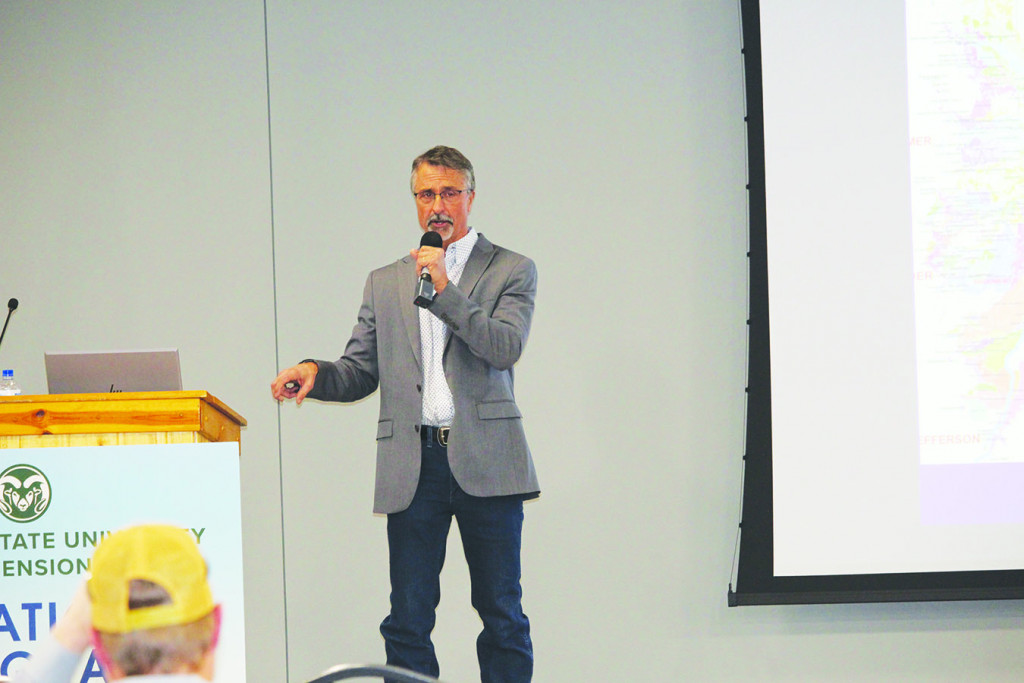SRM Ag Conference keynote shares river story

ALAMOSA — When it comes to water conflicts, Jim Yahn, long-time manager of North Sterling Irrigation District, has quite a story to tell. For almost 30 years, Yahn has been at the helm, overseeing the diversion and distribution of water to over 350 farmers from the North Sterling and Prewitt Reservoirs that, together, provide irrigation water to approximately 70,000 acres.
That role put Yahn on the frontline of matters twenty years ago when a court ruling resulted in the office of the state engineer shutting down thousands of wells on the South Platte.
Yahn, as the keynote speaker at the 40th Southern Rocky Mountain Agriculture Conference and Trade Show on Feb. 2 in Monte Vista, shared with a large, standing-room-only audience of nearly 500 people the hydrogeological history of the South Platte, leading up to 2002 when the drought — described as the “crucible” — resulted in surface water users on the opposite side of the fence from groundwater users and augmentation plans filled up the dockets of water court for almost three years.
It was a story that most in the audience knew very well. The situation on the South Platte was the spark that ignited what would become the Rio Grande Water Conservation District’s Subdistrict No. 1 more than a decade later.
But the most compelling part of Yahn’s story was not told so much in acre-feet, case law or augmentation plans. It was not even told with great drama or flourish. In a quiet voice and simple, straightforward language, Yahn used a single scene to capture a situation where, over the course of years, a community accustomed to abundant water found themselves facing a diminishing supply of water with one group having access to water for irrigation while the other did not.
“So, you had one farmer who irrigated from a reservoir — a reservoir he’d helped to pay for — not having any water to grow a crop looking out and seeing his neighbor growing crops with water pumped from a well.”
Yahn didn’t describe it further. It wasn’t necessary. The silence in the room seemed to suggest the image — what it looked like, what it probably felt like — was clear in everyone’s mind.
A situation already loaded with stress that comes hand-in-hand with a scarce supply of water that people rely upon for their livelihoods, was suddenly escalated by decisions made outside of the community of farmers, themselves. Those decisions, as Yahn describes it, “pushed farmers into opposite corners and determined to stand their ground.”
Yahn brought the story back to the San Luis Valley, acknowledging that local farmers knew very well of those dynamics.
“We [on the South Platte] didn’t have time to work it out ourselves. We were thrown into the middle of the situation. I think…I think your way is better,” saying without actually saying the collaborative and collective process that led to the formation of the subdistricts was far preferential to the litigious path farmers on the South Platte were forced to travel.
At the end of his address, Yahn spoke about the nature of small-town communities where people “work together more…helping their neighbors and putting themselves in their neighbors’ boots.”
He then described himself as a Christian and quoted the two most important commandments. The first is, “Love thy God with all thy heart.” The second, which Yahn says he has tried to follow, underscored his message. “Love thy neighbor as thy self.”
Among the handful of questions asked at the end, one person asked Yahn to weigh in on the Renewable Water Resources proposal to use American Rescue Plan Act money to secure water in the San Luis Valley for Douglas County.
“I wouldn’t like it,” he answered. He then added, “There’s a right way and a wrong way to do things.”
After a brief pause, he answered the question, “I’m opposed to it.”



